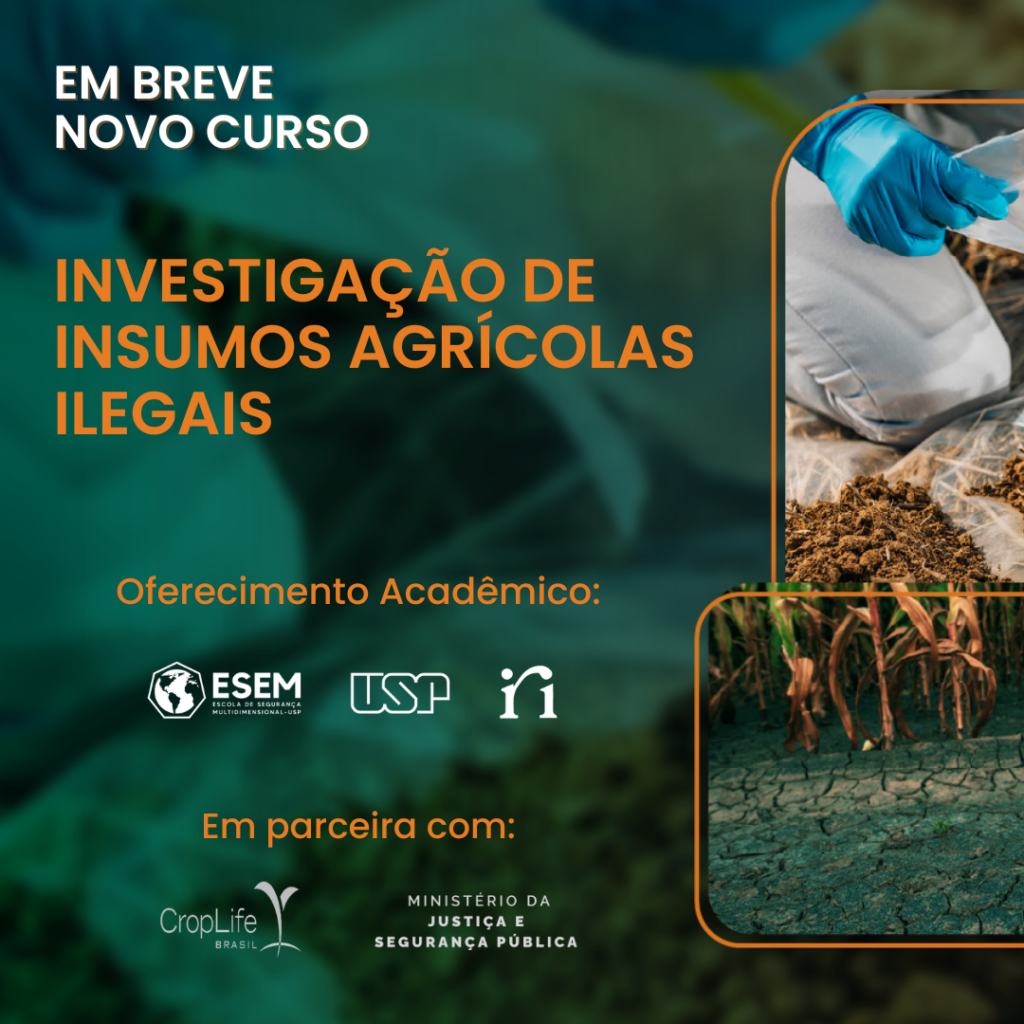
General Information
- Duration: 8 weeks
- Offering: February 5 to April 11, 2023
- Target Audience: Public and private security agents; members of the armed forces; public officials; undergraduate and graduate students
- Format: 100% online and free
- Subscriptions
ABOUT THE COURSE
GENERAL OBJECTIVE
SPECIFIC OBJECTIVES
TARGET AUDIENCE
HOURS
METHODOLOGY
TEACHING METHODS
ABOUT THE COURSE
The agricultural sector in Brazil and other Latin American and Caribbean (LAC) countries plays a vital international role in food production and the development of sustainable tropical agriculture. Agriculture is very important for several economies in the region, accounting for between 5 and 18 percent of GDP in 20 Latin American and Caribbean countries, making the sector fundamental for boosting economic growth, promoting trade, generating jobs, increasing income and reducing poverty, agriculture also has the function of preserving the world's food and nutritional security. Because of its unique importance, the sector suffers from the problem of illegal agricultural inputs, which can account for up to 20% of all revenues in this market, making it one of the top 10 illicit markets for organized crime, whether national or transnational.
Faced with this contemporary and complex challenge, the School of Multidimensional Security (ESEM-USP) is promoting the fourth stage of the "Program to Combat Illicit Markets", focusing on investigation and prosecution processes. The course is made up of a team of high-level instructors from Academia, the Private Sector and Public Security Institutions, who jointly share their experiences and knowledge to help combat the Criminal Organizations (ORCRIM) that operate in the sector.
The Distance Learning Course on Investigating Illegal Agricultural Inputs offers continuing professional training for Brazilian and Latin American public and private security agents who work in regions where illegal agricultural inputs are produced, circulated and marketed. The main objective is for the trainee to be better qualified to act in recognition, seizure, handling, inspection and investigation, as well as to know the techniques, procedures and risks associated with handling these products.
GENERAL OBJECTIVE
The Distance Learning Course on Investigating Illegal Agricultural Inputs offers continuing professional training for Brazilian and Latin American public and private security agents who work in regions where illegal agricultural inputs are produced, circulated and marketed. The main objective is for the trainee to be better qualified to act in recognition, seizure, handling, inspection and investigation, as well as to know the techniques, procedures and risks associated with handling these products.
SPECIFIC OBJECTIVES
The course aims to provide students with knowledge of certain approaches associated with the illegal agricultural inputs market, such as the economic bias and the logistical bias of these products and their production chain.
In addition, as a way of reflecting reality, the course also offers a wide range of practical knowledge, applicable in the daily lives of security agents, such as conducting forensics and producing evidence, the chain of custody and criminal classification.
This initiative also aims to help students learn about interagency cooperation, the logic of legal-police cooperation, the many forms of partnership with the private sector and the intelligence system at different levels.
Finally, considering the international dimension of the problem of illegal agricultural inputs, the course aims to address international cooperation and the classification of illegal activities in neighboring countries (Paraguay, Uruguay and Argentina).
TARGET AUDIENCE
Public Security agents (Civil Police, Military Police, Federal Highway Police, Federal Police, Technical-Scientific Police, Municipal Guards); Inspection agents of federal, state and municipal entities, public or private; Agents of the Judiciary and Public Prosecutors, federal and state; Public servants; Undergraduate and graduate students.
HOURS
O Curso será oferecido entre 5 de fevereiro e 09 de abril de 2024 (8 semanas), tendo carga horária total de 30 horas de atividades síncronas e assíncronas. O aluno aprovado deverá assistir 75% das aulas disponibilizadas, sendo seu certificado emitido pela Universidade de São Paulo em até 20 dias úteis do término oficial do curso, isto é, em 09 de abril.
METHODOLOGY
The methodology used in the course will be Problem-Based Learning, which seeks to create a dialog between practical topics and theoretical concepts. The aim of this methodology is to bring the subject and the target audience closer together through the exchange of information, increasing the scope for absorbing the content. Classes will be developed with a focus on enabling students to use the knowledge presented in their own practice
profissional.
The individual lessons will be formatted using the micro-learning methodology, which consists of short videos interspersed with questions to fix the content. The videos and exercises create a knowledge trail that enables students to use the concepts immediately after they have been presented, which promotes dynamic learning.
TEACHING METHODS
A dynamic teaching platform that allows for communication and the availability of various materials, in addition to the courses themselves;
Provision of content handouts for each of the classes;
When necessary and indicated, there will be supplementary support material, made available along with the lessons;
There will be tutorials on the platform to support students with the use of the platform, access to courses, among others;
Discussion forums
The students will have a team of international monitors that will support them throughout the course with academic issues, case studies, and other activities.


